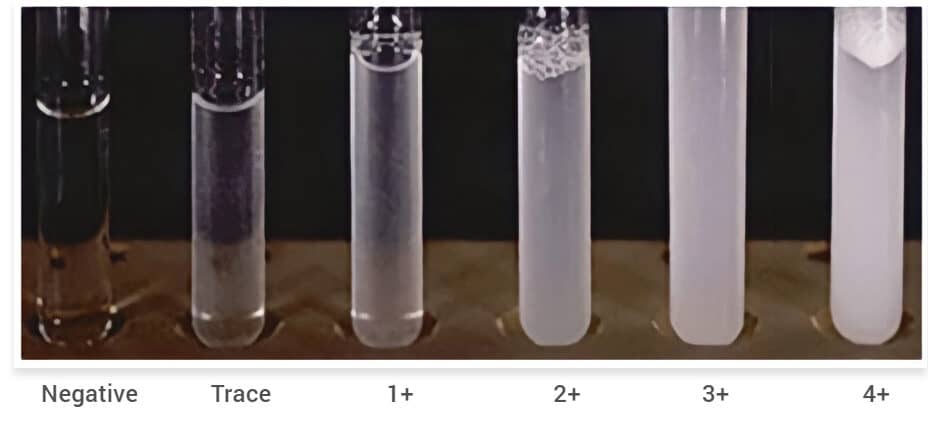Sulfosalicylic acid test (SSA) is a semiquantitative simple and inexpensive test for detection of protein in urine . It is not as sensitive as other tests for proteinuria, such as the urine dipstick test, but it is more specific. This means that it is less likely to give a false positive result.
Presence of abnormal amount of protein in urine is referred as Proteinuria. It indicates that proteins, which are normally too large to pass through the filtering units of the kidneys (glomeruli), have entered the urine due to a disruption in the kidney’s filtration and reabsorption processes. The presence of proteinuria can be an important indicator of various underlying health conditions, particularly those affecting the kidneys and urinary system.
What are Common conditions causing proteinuria?
- Glomerular Diseases:
- Nephrotic Syndrome: A group of symptoms characterized by significant proteinuria, low blood protein levels, high cholesterol, and edema (swelling). Conditions like minimal change disease, focal segmental glomerulosclerosis (FSGS), and membranous nephropathy can cause nephrotic syndrome.
- Glomerulonephritis: Inflammation of the glomeruli, which can result from various causes such as autoimmune disease like SLE, infections, and systemic diseases.
- Diabetes Mellitus:
- Diabetic Nephropathy: Kidney damage caused by long-standing diabetes. Elevated blood sugar levels can damage the kidney’s filtering units, leading to proteinuria and eventually kidney failure.
- High Blood Pressure (Hypertension):
- Uncontrolled high blood pressure can damage the blood vessels in the kidneys, impairing their filtering ability and causing proteinuria.
- Infections:
- Urinary Tract Infections (UTIs): Infections in the urinary tract can lead to temporary proteinuria. If untreated, they can potentially cause kidney damage.
- Systemic Lupus Erythematosus (SLE):
- An autoimmune disorder that can affect various organs, including the kidneys. Lupus nephritis can lead to proteinuria and kidney damage.
- Multiple Myeloma:
- A cancer of plasma cells that can produce abnormal proteins (monoclonal immunoglobulins) that may be excreted in the urine, causing proteinuria.
- Amyloidosis:
- A condition in which abnormal proteins called amyloids are deposited in tissues and organs, including the kidneys, impairing their function and causing proteinuria.
- Preeclampsia:
- A complication of pregnancy characterized by high blood pressure and damage to organs, including the kidneys, leading to proteinuria.
- Chronic Kidney Disease (CKD):
- Conditions that result in long-term damage to the kidneys can cause proteinuria as kidney function deteriorates . For further information on ,CLICK THE LINK BELOW
https://www.kidney.org/atoz/content/about-chronic-kidney-disease
How is proteinuria diagnosed?
Proteinuria is diagnosed by a urine test. The most common urine test for proteinuria is the urine dipstick test. The urine dipstick test can detect small amounts of protein in the urine. If the urine dipstick test is positive for proteinuria, then a more sensitive test, such as the 24-hour urine collection test, may be performed to confirm the diagnosis and to measure the amount of protein in the urine.
what is principle of sulfosalicylic acid test?
The sulfosalicylic acid test is based on the ability of sulfosalicylic acid, a chemical reagent, to precipitate proteins from solution. When a protein is exposed to a precipitating agent like sulfosalicylic acid, the acid disrupts the protein’s native conformation (its folded, functional shape). This process is called denaturation. Denaturation involves the disruption of various non-covalent interactions ( tertiary structure of protein) that maintain the protein’s three-dimensional structure, including hydrogen bonds, hydrophobic interactions, and electrostatic interactions.
Benefits of Using the Sulfosalicylic Acid Test
The SSA test is often used as a screening test for proteinuria. If the SSA test is positive, then a more sensitive test, such as the urine dipstick test, biochemical analysis of urine protein may be performed to confirm the diagnosis.
The SSA reaction will detect globulin and Bence-Jones proteins, in addition to albumin.
SSA testing can be used for the detection of urinary free light chain immunoglobulins which are not detected by dipstick, as dipstick is specific for albumin.
How is the test performed?
- Check the pH of the urine. If the pH is alkaline or neutral, add 10% acetic acid solution, drop by drop, until it is just acidic (about pH 6).
- Centrifuge the urine. If the urine is cloudy, centrifuge it for 5 minutes at 1800 rpm, seperate supernatant in another tube and label it.
- Pour equal amounts of urine and sulfosalicylic acid into a test tube. If you are taking 3ml urine add 3ml 5% sulfosalicylic acid
- Mix the contents of the test tube by gently inverting it several times.Do not shake vigorously
- Let the test tube sit for 5 minutes.
- Observe the test tube for the presence of a precipitate.
- Examine the test tube for turbidity against a dark background.
If a precipitate is present, the amount of precipitate is graded from 1 to 4, with 1 being the lightest precipitate and 4 being the heaviest precipitate.
Here is a table of the SSA test grading scale:
| Grade | Amount of precipitate |
|---|---|
| 1+ | Faint precipitate that is barely visible |
| 2+ | Moderate precipitate that is easily visible |
| 3+ | Heavy precipitate that is clearly visible |
| 4+ | Very heavy precipitate that obscures the urine |

Interferences that can affect the accuracy of protein testing in urine include:
- Uncentrifuged Cloudy Urine:
- Cloudy urine due to particles like cells, crystals, or mucus can interfere with protein testing. Centrifugation of urine before testing helps to remove these interfering particles and obtain a clearer sample for analysis.
- High Levels of Certain Drugs (e.g., Penicillin, Sulfonamides, Cephalosporin):
- Some medications, such as penicillin, sulfonamides, and cephalosporin antibiotics, can cause false positive results in protein tests. This can lead to overestimation of protein levels in the urine.
- Highly Buffered Alkaline Urine:
- Urine with a highly alkaline pH (above 7) can interfere with protein testing methods, potentially causing false positive results. Alkaline urine may trigger protein precipitation or interactions with reagents, leading to inaccurate readings.
